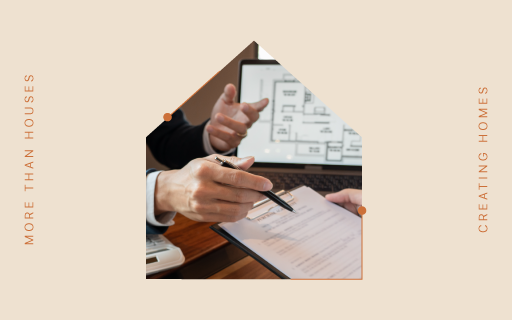Buying a home is one of the most significant financial decisions people make during their lives and also a major accomplishment to feel proud of, since, for most of them, it implies a commitment to smart financial management practices, a responsibility that they assume to guarantee themselves a future in which their housing status no longer depends on paying rent.
Because of the huge financial commitment involved, many Americans believe that this big dream of buying a home is just that—a dream that’s far from reality. This is what some surveys indicate, such as one conducted by IPX 1031 that found that seventy percent of Americans believe that homeownership is out of reach. Certainly, this isn’t the case for people who have this project in mind and are committed to adjusting their practices towards responsible financial planning in order to pursue this goal.
If you are part of that group of people, we want to reassure you you’re thinking smart, since a well-thought-out plan not only helps you afford a home but ensures long-term financial stability after you’ve moved in. And we want to help you achieve it, so we have prepared this step-by-step breakdown to guide you through the financial side of becoming a homeowner. Let ‘s start!
Why Is It Important to Make Smart Financial Planning Before Buying Your Home?
Buying a home isn’t just about choosing the right neighborhood or finding the perfect layout—it starts with building a solid financial foundation. While it’s easy to get caught up in the excitement of imagining your dream kitchen, the real journey to homeownership begins much earlier: with smart financial planning. This step is essential because it helps you understand your true financial position and avoid taking on more than you can handle.
On the other hand, by reviewing (and fixing) some important financial aspects, you reduce the risk of financial stress down the line. Put simply, it offers peace of mind and long-term financial stability, so that your home becomes a source of security—not a financial burden. Now, let’s review some of the aspects you have to consider to make comprehensive financial planning.
1. Check Financial Health and Your Credit Score (and Work on It)
Before you even think about looking at homes, take a hard look at your financial health. Start with your credit score—a key factor lenders use to determine your mortgage eligibility and interest rate. You can access your credit report for free once a year from each of the three major credit bureaus (Experian, TransUnion, and Equifax).
A score above 700 is considered good, but the higher your score, the better the loan terms you’re likely to receive. If your score is low, take steps to improve it: pay down existing debt, make payments on time, and avoid opening new lines of credit unnecessarily. Small improvements in your credit score can lead to significant savings on interest over the life of your loan.
2. Create a Budget of Current Expenses
Understanding your current financial obligations is crucial before committing to buying a home and taking on a mortgage or accepting a loan. We recommend you to list all your monthly expenses—including rent, utilities, groceries, transportation, insurance, subscriptions, and personal spending. Don’t forget irregular expenses like quarterly insurance premiums or annual memberships.
Compare this with your monthly income to calculate your debt-to-income (DTI) ratio, which lenders also evaluate. Ideally, your total DTI should be below 36%, with no more than 28% of your income going toward housing costs (this is known as the 28/36 rule). If your expenses are too high, identify areas to cut back. This is not only good for getting loan approval but also for ensuring you’re financially comfortable after your home purchase.

3. Consider Extra Expenses and Build an Emergency Fund
Buying a home involves more than just the down payment and mortgage. There are numerous extra costs: property taxes, homeowner’s insurance, maintenance, repairs, utilities, you name it. You should also be prepared for closing costs, which can range from 2% to 5% of the home’s purchase price.
In addition to these expected costs, it’s essential to have an emergency fund. Life is unpredictable—job loss, medical emergencies, or major home repairs can arise without warning. A good rule of thumb is to have three to six months’ worth of living expenses set aside. This safety net will provide peace of mind and keep you from falling into debt when unexpected expenses occur.
4. Develop a Dedicated Savings Plan
Now that you understand your current financial standing and the costs involved, it’s time to create a savings plan focused on your home purchase. Start by determining your target down payment. While many believe you need 20%, there are mortgage options that allow as little as 3% to 5% down. Still, a larger down payment will reduce your monthly mortgage and eliminate private mortgage insurance (PMI), saving you money in the long run.
Set a monthly savings goal and consider creating a separate high-yield savings account exclusively for your home fund. Automate contributions to ensure consistency. Track your progress and adjust your budget if necessary to stay on course. And remember, the more you save now, the better positioned you’ll be when it’s time to buy!
5. Get Pre-Approved for a Loan
Once you’ve saved a solid amount and have your finances in order, the next step is to get pre-approved for a mortgage loan. This is more than just a prequalification; it involves submitting documentation of your income, credit, and assets to a lender, who then provides a letter stating how much you’re qualified to borrow.
A pre-approval serves multiple purposes. It tells you how much home you can realistically afford, makes you more attractive to sellers, and speeds up the closing process. Keep in mind that a pre-approval is typically valid for 60 to 90 days, so time your application accordingly.
(Link this segment to the article we’ve already written about The Ultimate Guide to Qualifying for a Mortgage)
6. Explore Financing Options (Assistance Programs)
Many first-time buyers aren’t aware of the variety of assistance programs available. Federal, state, and local governments often offer help with down payments, closing costs, or favorable loan terms. Some of them are:
- FHA loans (low down payment and easier credit requirements)
- VA loans (for veterans and active-duty military)
- USDA loans (for rural and suburban homebuyers)
- First-time buyer grants or forgivable loans offered by local housing agencies
Taking advantage of these resources can make homeownership more accessible and affordable.
7. Research Home Loan Options
Not all mortgages are created equal. Understanding your options will help you choose the best loan for your situation. The most common types include:
- Fixed-rate mortgage: Your interest rate stays the same for the life of the loan (typically 15, 20, or 30 years), offering predictability in payments.
- Adjustable-rate mortgage (ARM): Offers a lower initial interest rate, which adjusts after a set period (good if you plan to move or refinance before the rate adjusts).
- Conventional loan: Not insured by the government, usually requiring a higher credit score and down payment, but with competitive rates.
It’s sensible not to make a final decision without considering all the different alternatives. Compare interest rates, terms, fees, and required down payments from multiple lenders. Many websites allow you to use their online calculators to estimate your monthly payments and long-term costs, so you can benefit from this tool too.
7. Seek Professional Guidance
Finally, navigating the financial aspects of buying a home can be overwhelming, so don’t be afraid to seek professional advice. A financial advisor can help you determine a realistic budget, optimize your savings strategy, and ensure your investment aligns with your long-term goals.
Likewise, a reputable real estate agent can guide you through the buying process, helping you find homes within your budget and negotiating on your behalf. Mortgage brokers can also be helpful in comparing loans from various lenders, saving you time and money.Here at DCR Homes, we are experts in helping our clients’ housing projects and dreams come true. They trust us to find the best option that fits their budget and needs. So don’t hesitate to discuss your options with us, and we’ll be happy to accompany you on this exciting journey.




